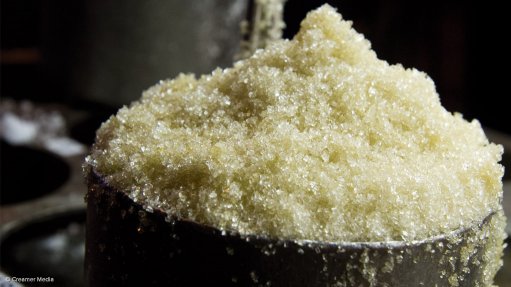
Photo by: Creamer Media
Increasing sugar imports and the so-called sugar tax are significant risks that may impact on the profitability of the agricultural sector in the short to medium term, says Land Bank research analyst Gilberto Blacuana.
He adds, however, that these risks can be mitigated through higher import tariffs and investment in alternative uses of sugarcane, such as ethanol production.
“The global sugar market is distorted by production and export subsidies, which create an oversupply of sugar. Additionally, almost all countries have tariff protection in their domestic sugar industries.”
Blacuana says data from the South African Revenue Service shows that sugar imports from India have increased substantially in recent months.
He says the Indian government offers its sugar producers a $150/t rebate or subsidy on sugar exports.
“This unfair practice, or dumping, makes the Indian sugar [industry] competitive in the global market, thus depressing global prices. This unfair practice has prompted Brazil, the world’s largest sugar producer, and Australia, to lodge a formal complaint against India at the World Trade Organisation.”
This is especially relevant since markets compete for share in the massive sugar importer, the US, which increased its sugar imports by 58.3% between the 2015/16 and 2016/17 season, from 470 000 t to 744 000 t.
Moreover, Blacuana says South Africa’s export data shows that sugar exports had increased by 54.5% to 1.2-million tonnes in the 2017/18 season. The proportion of South Africa’s exports to domestic production increased from 13.6% in the 2016/17 season, to 37.3% in the 2017/18 season.
“Should the South African government not take further steps to protect the local market, the domestic market will come under renewed pressure from sugar imports from India. The industry has called for the tariff to be increased from R4 500/t to about R7 000/t.”
Meanwhile, Blacuana says the Health Promotion Levy, or sugar tax as it is better known, which was implemented in April 2018, involved a 5.2% increase in tax on sugar sweetened beverages.
Estimates from the South African Sugar Association indicate that the revenue lost since the implementation of the sugar tax is about R1.3-billion, Blacuana points out.
“While it is difficult to quantify the impact of imports and the sugar tax on employment, the South African Cane Growers Association estimates that the sugar tax is likely to lead to about 10 000 people losing their jobs in the primary level of the sugar value chain; however, this figure does not consider the impact on job losses in the milling and beverage industries. The sugar industry employs about 350 000 people.”
However, the African News Agency earlier this week reported that the National Treasury’s Mpho Legote had stated that any current estimates are guesswork and that the government was undertaking an assessment of the impact of the sugar tax.